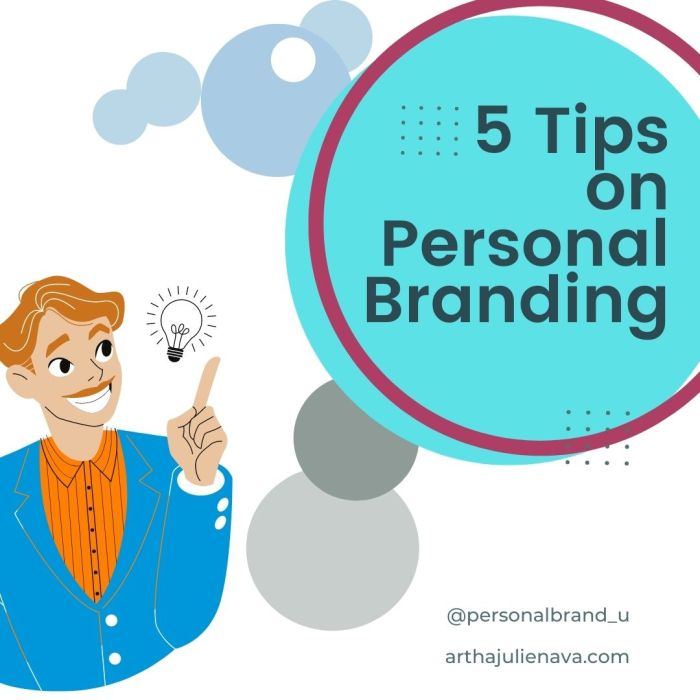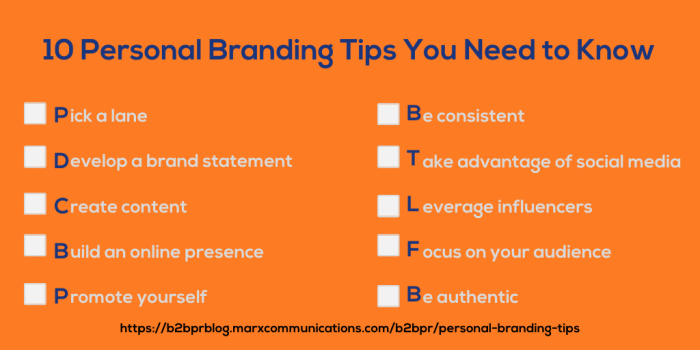Personal Branding Tips sets the stage for this enthralling narrative, offering readers a glimpse into a story that is rich in detail with american high school hip style and brimming with originality from the outset.
In a world where standing out is crucial, personal branding plays a vital role in shaping your identity and opening doors to new opportunities. It’s all about creating a unique image that resonates with your audience and sets you apart from the crowd. From defining your brand to leveraging social media, this guide will walk you through the essential tips to boost your personal brand.
Importance of Personal Branding

In today’s competitive world, personal branding plays a crucial role in setting individuals apart from the crowd. It involves creating a unique identity, establishing credibility, and showcasing one’s expertise in a particular field. Personal branding is essential for career advancement, networking, and attracting new opportunities.
Examples of Successful Personal Brands
- Elon Musk: Known for his innovative thinking and leadership in the tech industry, Musk has built a strong personal brand that is synonymous with cutting-edge technology and sustainability.
- Oprah Winfrey: With her authenticity, empathy, and storytelling skills, Winfrey has created a personal brand centered around empowerment, inspiration, and making a positive impact.
- Gary Vaynerchuk: A social media influencer and entrepreneur, Vaynerchuk has established a personal brand focused on hustle, authenticity, and providing value to his audience.
Benefits of Personal Branding
- Increased visibility and recognition in your industry.
- Enhanced credibility and trust among peers, clients, and employers.
- Opportunities for career growth, partnerships, and collaborations.
- Access to a wider network of like-minded individuals and industry leaders.
Building a Strong Personal Brand
Building a strong personal brand is crucial in today’s competitive landscape. It helps you stand out from the crowd, attract opportunities, and build credibility in your industry. Here are some strategies to define and establish a unique personal brand.
Defining Your Personal Brand
- Identify your values, strengths, and passions to define what sets you apart from others.
- Create a personal brand statement that clearly communicates who you are, what you stand for, and what you offer.
- Conduct a self-assessment to understand your unique skills and expertise that can add value to your audience.
Establishing Your Personal Brand
- Consistency is key across all platforms, including your website, social media profiles, and networking events. Ensure your messaging, visuals, and tone are cohesive.
- Engage with your audience regularly by sharing valuable content, interacting with followers, and showcasing your expertise.
- Collaborate with influencers or industry experts to expand your reach and credibility within your niche.
The Role of Authenticity and Storytelling
Authenticity is essential in building a strong personal brand. Be genuine, transparent, and true to yourself in all your interactions. Storytelling can help humanize your brand and connect with your audience on a deeper level.
Remember, your personal brand is not just about what you do, but who you are and how you make others feel.
Leveraging Social Media for Personal Branding: Personal Branding Tips

In today’s digital age, social media has become a powerful tool for building and promoting your personal brand. With the right strategies, you can effectively use various platforms to showcase your skills, expertise, and personality to attract a wider audience and create meaningful connections.
Utilizing Different Social Media Platforms
Each social media platform serves a different purpose and caters to a unique audience. Here are some tips on how you can leverage different platforms for personal branding:
- LinkedIn: Showcase your professional experience, skills, and achievements to establish yourself as an industry expert.
- Instagram: Use visually appealing content to showcase your creativity and personality, giving followers a glimpse into your daily life.
- Twitter: Share industry insights, engage in conversations, and showcase your thought leadership through concise and impactful tweets.
- YouTube: Create video content to share knowledge, tutorials, and behind-the-scenes glimpses to connect with your audience on a more personal level.
Creating Engaging Content
To attract and retain followers on social media, it’s essential to create content that is not only informative but also engaging. Here are some tips to create compelling content:
- Know your audience and tailor your content to their interests and preferences.
- Use a mix of formats such as videos, images, infographics, and text to keep your feed diverse and engaging.
- Interact with your followers by responding to comments, messages, and engaging in conversations to build a loyal community.
- Collaborate with other influencers or brands to expand your reach and attract new followers.
Dos and Don’ts of Social Media for Personal Branding, Personal Branding Tips
When using social media for personal branding, it’s important to keep in mind some dos and don’ts to maintain a positive online presence:
- Do: Be authentic and genuine in your interactions, share valuable content, and engage with your audience regularly.
- Do: Consistently post content to stay top of mind with your followers and maintain a consistent brand image.
- Don’t: Overshare personal information or engage in controversial topics that may harm your reputation.
- Don’t: Buy followers or use bots to artificially inflate your following, as it can damage your credibility in the long run.
Personal Branding Across Different Industries
When it comes to personal branding, it’s essential to understand that each industry has its own unique characteristics and requirements. Tailoring your personal brand to fit the specific industry you are in can greatly enhance your success and credibility. Let’s explore how personal branding varies across different industries and share some industry-specific tips and best practices.
Tech Industry
- Highlight your technical skills and expertise through your online presence.
- Stay updated with the latest trends and innovations in the tech industry.
- Engage with other professionals in the tech industry through networking events and online communities.
- Showcase your projects and achievements on platforms like GitHub or personal portfolio websites.
Fashion Industry
- Develop a unique and consistent style that reflects your personal brand.
- Collaborate with fashion influencers and brands to increase your visibility.
- Create visually appealing content on social media platforms like Instagram to showcase your fashion sense.
- Attend fashion events and shows to network with industry professionals and build connections.
Finance Industry
- Establish yourself as a thought leader in finance by sharing insights and analysis on relevant topics.
- Build a strong professional network within the finance industry through LinkedIn and industry events.
- Showcase your certifications and qualifications to demonstrate your expertise in finance.
- Provide value to your audience by sharing financial tips and advice through blogs or podcasts.